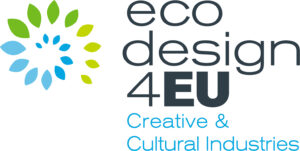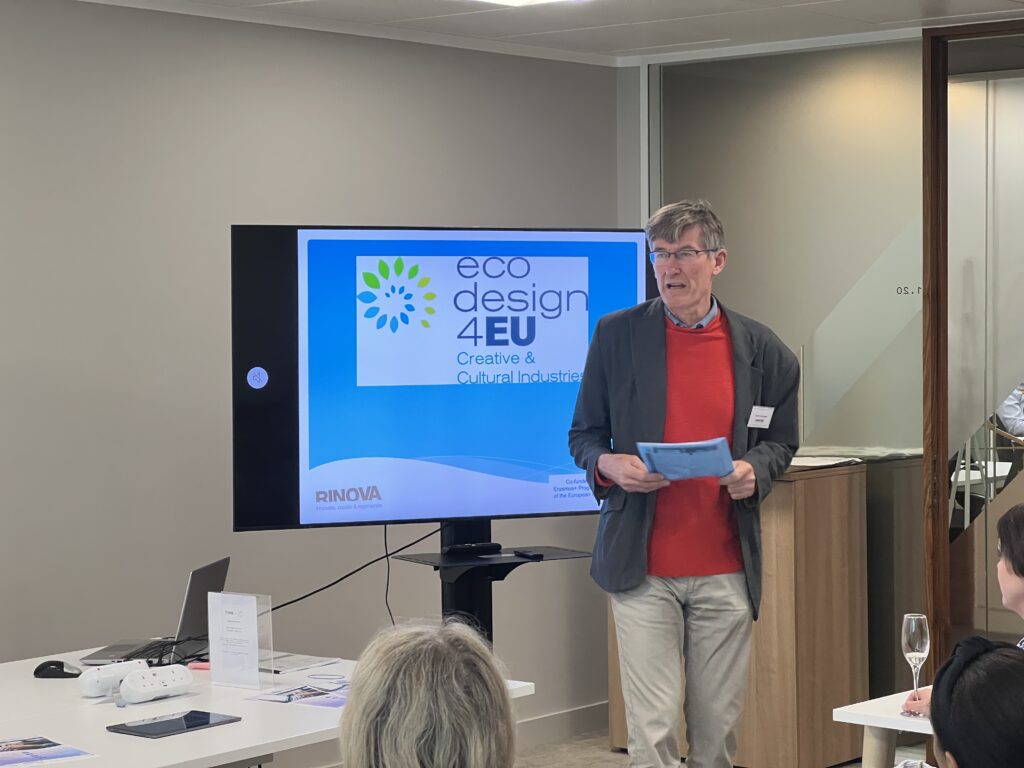 Climate change is one of the greatest challenges facing humanity today. It is a complex subject. Many solutions require a new paradigm of radical changes of policy at national and supra-national level. Understanding what actions we can take at an individual and organisational level is not straightforward and can leave us feeling powerless to know how to act effectively.
Climate change is one of the greatest challenges facing humanity today. It is a complex subject. Many solutions require a new paradigm of radical changes of policy at national and supra-national level. Understanding what actions we can take at an individual and organisational level is not straightforward and can leave us feeling powerless to know how to act effectively.
One of the ways in which Rinova is supporting effective action is through participating in an innovative European partnership focusing on processes of Ecodesign in the Creative and Cultural Industries (CCIs). EcoDesign4EU offers free accessible training materials to help teachers, trainers, mentors, students and businesses to acquire and apply Ecodesign principles in the arts, creative and cultural field, contributing to leading the transition to a Circular Economy in these sectors.
The result is a new reference framework for the sector that brings together a range of work-based learning materials, practical activities and relevant links for further study. Aimed at tutors and trainers, the curriculum will help to upskill these professionals to support students to acquire knowledge on how to apply the principles of Ecodesign in the CCI environment. The heart of the learning content is a Virtual Campus consisting of 9 learning units including implementing Ecodesign principles, sustainable strategic business planning and design principles, circular supply chains, selecting sustainable resources, lifecycle assessment methodologies, sustainable digital transformation and adapting concepts of the circular economy to the CCI sector. As an open educational resource you can access the virtual campus, including an online instructional guide for digital competences in virtual learning, here.

Rinova’s Trevor Burgess presenting EcoDesign4EU’s virtual campus in London (May, 2023)
In May we presented the virtual campus to over 40 professionals and partners at the launch of our new London office, and the following week we hosted the Ecodesign4EU partners in London. In addition to the project meeting, our European colleagues from Malta, Spain, Ireland and Greece joined us on a study visit and tour of sustainable initiatives by our partner Collage Arts in the Wood Green Cultural Quarter in North London.
In July, alongside colleagues from InfoDef in Spain and Materahub in Italy, Rinova organised an online training session for tutors and trainers from the 5 partner countries, who are currently piloting the curriculum. Trainers found it particularly valuable to hear some of the deeper reasons behind the content that the partners have developed, its importance and urgency. They commented that it is a comprehensive and relevant set of courses and resources on the topic, well-structured, pretty easy to use and accessible, with dynamic activities complementing the materials.

EcoDesign4EU partners visiting the Pram Depot recycling project at Collage Arts.
Confronting the climate change challenge more than any other requires a holistic mindset, to understand the wider context and interdependent impacts of any actions taken. Whilst being focused specifically on the creative and cultural industries, the Ecodesign4EU Modules all rely on inter-related policies and frameworks in Europe and across the globe and in all sectors of the economy. So, in addition to the virtual curriculum, Rinova and the partners have produced an analysis report on national and European policies on Ecodesign. The report sets the development of specific guidelines on Ecodesign for artists, organisations and VET providers in the Creative and Cultural Industries in a wider context of governmental response to the climate crisis and transition to a sustainable green economy. As a summary overview, it begins with the global context of the key actions the world has taken in response to climate change. It then summarises how the European Union has framed its response to these challenges. Finally there are sections, contributed by each of the project partners, on national Ecodesign policies in each country. With links throughout to more detail about the policies that are referenced, this is a starting point for tutors and trainers to get to grips with key policies for the transition to a circular economy.
 The European Commission support for the production of this publication does not constitute an endorsement of the contents which reflect the views only of the authors, and the Commission cannot be held responsible for any use which may be made of the information contained therein.
The European Commission support for the production of this publication does not constitute an endorsement of the contents which reflect the views only of the authors, and the Commission cannot be held responsible for any use which may be made of the information contained therein.


